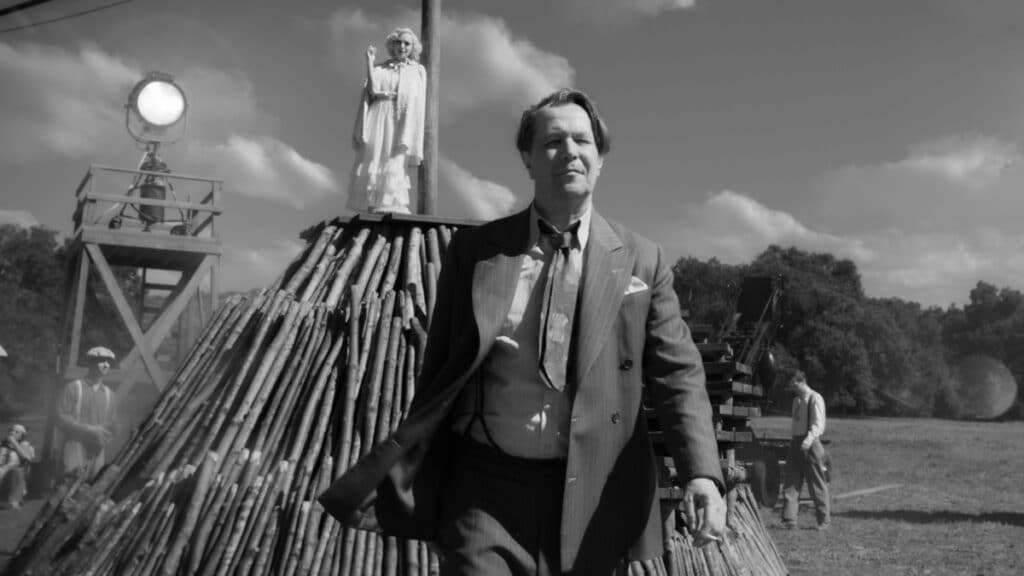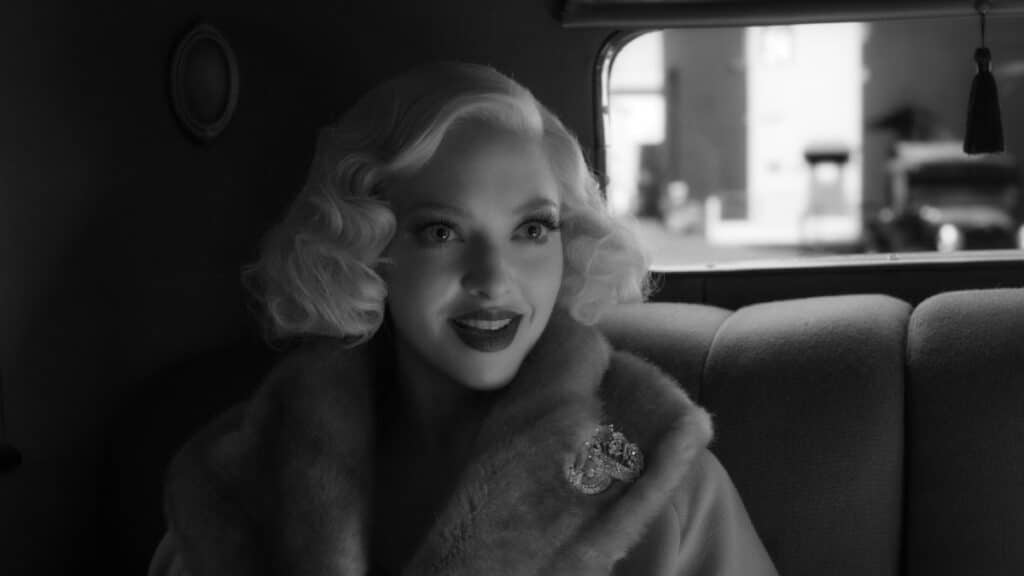Mank (2020) is a biographical drama, written by Jack Fincher, directed by David Fincher. The film begins in the Mojave Desert. Screenwriter Herman J. Mankowicz, Mank (Gary Oldman) to his friends, is being deposited in a makeshift hospital room. The nature of his injuries have yet to be revealed to us, but rest assured, he is fucked up. Among his attendants are his stenographer Rita Alexander (Lily Collins), his personal assistant Eve (Leven Rambin), and his manager John Houseman (Sam Troughton).
As Mank is being placed in traction, we are informed of his purpose here in the Mojave Desert. Orson Welles (Tom Burke) has contracted Mank to write a screenplay for his upcoming film, Citizen Kane (Orson Welles, 1941). He has ninety days to produce his script, which he will dictate to Rita from his bed. Following a brief telephone call from Welles, that deadline is amended to sixty days.
As Mank writes the script for Citizen Kane while convalescing in the middle of nowhere, we are told, through a series of flashbacks, the story of how this all came to be. We are told the origins of Citizen Kane. We learn about Mank, his credentials, and his tumultuous relationship with certain members of the Hollywood aristocracy.

We are introduced to a cornucopia of Hollywood’s heaviest hitters of the era, from both behind, and in front of the camera. Everyone from Ben Hecht (Jeff Harms), to Marion Davies (Amanda Seyfried), to David O. Selznick (Toby Leonard Moore) plays a part in Citizen Kane’s labyrinthine origins. Origins which are painstakingly examined for all 131 minutes of Mank.
The first thing I would like to do is recuse myself from any responsibility for this review. In pursuit of full disclosure, I must admit, I felt slightly out of my depth with this film. Citizen Kane is one of the most important films in film history. Even if you are one of those who dislikes Kane, no one would suggest that the film hasn’t been immensely influential, as well as a cornerstone of Hollywood history. With Mank, David and Jack Fincher have painted a powerful and intricate portrait of the man behind the script, and the circumstances that elevated him to legendary status. Circumstances that weaved a magic-bullet-like trajectory through Hollywood royalty.
I consider myself something of a fan of classic Hollywood, so I recognized a number of the players. However, I knew so little about the history of Citizen Kane, I was slightly lost sometimes. The Finchers do a great job of examining the politics of the time, how they impacted the development of Citizen Kane, and relating them to the political discourse of today. But, I’m kind of a dumbass. While watching Mank, I felt like I was listening to two scholars discuss a fascinating subject, with both depth and passion, while I’m tapping my foot and jingling my car keys because I’m only there to give one of them a ride home.
So when it comes to my opinion versus that opinion of someone who actually knows about all the shit that this film was really talking about, I’m going to suggest that their opinion might be the one that should hold a little more water for you. Mank is a Lobster Thermidor film, while I’m just a Fuddrucker’s critic. As such, this review should be taken with a grain of salt.
There is much to like about Mank, beyond its meticulous nature. The performances find everyone swinging for the fences and frequently connecting. Gary Oldman is someone who I have always praised effusively. The man is quite possibly the greatest screen actor of our time. With Mank, he adds to his resume, another amazing biographical portrayal of a personality of note. From Sid Vicious to Beethoven to Churchill, Oldman has become the go-to-guy when it comes to playing these kind of roles. As Herman Mankowicz, the trend continues unabated.

The supporting cast is all pretty solid too. There are a number of fine turns by members of the cast. Charles Dance, Amanda Seyfried, Ferdinand Kingsley, and Tuppence Middleton are all good in their various supporting roles. The film belongs to Oldman, but he has quality support in spades. Although I should mention that Arliss Howard is absolutely scene stealing in his portrayal of Louis B. Mayer. So good was he, that I was bummed that all of his meatiest scenes were right up front. I needed to remind myself that the film was called Mank, and not Mayer.
Mank was also presented in an appealing way, structurally speaking. There are basically two stories running parallel to one another. The first is the “current day” story about Mank writing a script with his ass in an ass cast. The second takes place about four years prior, and details the politically charged Hollywood scene at the time. It sets up not only how Mank came to land the job of writing Kane, but also illustrates the various relationships that Mank is involved in that will inevitably be turned on their respective ears, following completion of such an incendiary screenplay.
The two stories are told side by side, alternately shifting between the current timeline, and what has transpired over the last four years, shown in flashback. I appreciated the back and forth nature of the film’s progression. Mank is a film that is dense with historical and interpersonal information. By switching back and forth from the past and the present, the story is allowed to breathe, alternating between heavy, and light material. It keeps the proceedings interesting, and it kept my eyes from glazing over. I also appreciated the very clear, and very specific delineation between the flashbacks and the current stuff. Like I said, I’m a handful of IQ points shy of average. I was glad that Mank was constructed in a way that allowed me to participate.
There was some elements of Mank that prevented me from executing my customary cartwheels and champagne toasts that typically conclude my viewing of a film I loved. The most significant of which is that Mank is major, MAJOR inside baseball. Even people who are keenly aware of the legacy of Citizen Kane, and may even know some of its backstory, might find themselves asking “okay, wait, who is that” at various points in the film. With the possible exception of those who really know the full story, a visit or two to Wikipedia is going to be an absolute necessity.
So deep does Mank go that it might be off-putting for many in a mainstream audience. Mank is a love letter’s love letter. I am tempted to suggest that Mank is a strictly for-fans-only affair. While I’m certain that this film will be showered with praise come Oscar season (let’s not forget, Hollywood LOVES to S its own D), I question just how much John Q. American can dig it. Biopics often stimulate the desire to learn more about their subject material. However, Mank is such a complex portrait of Hollywood and the time in which it is set, that it might have viewers clearing their hands and walking away from the table, instead of cracking open an encyclopedia.

Another thing that I took issue with was the way in which the film was stylized. In my honest, yet worthless opinion, Mank suffered from being over-stylized. I appreciated the use of black and white as a means to root this picture in its proper chronological setting. However, there was something about the look of this film that I don’t exactly know how to describe, yet was a thing for me.
This is gonna sound dumb, but the film was hard to see. I know how ridiculous a claim that is to make about a movie I just WATCHED. Trouble is, I don’t know any other way to describe it. I kept having the urge to squint at this thing even though I could see it. And this isn’t some kind of chiaroscuro lighting gone wrong kind of thing either. The lighting was fine. Spectacular in some places. But there was just something about the look of this film that felt like my eyeballs were coated in ice and the film kept slipping off of them. I mean, if that makes any sense.
This could be the result of the film using way more CGI than I had imagined it would. Was all of the CGI was an intentional choice from the beginning? Or was it the result of Corona-19 shutting everything down for months, forcing the filmmakers to finish everything in front of a green screen? I haven’t done enough research to be sure. Regardless, I was disappointed at the extensive use of computer generated imaging. Even the fires in the fireplaces in William Randolph Hearst’s (Charles Dance) home were cartoon fires. The film just looked really fake for much of the film and I didn’t like that. It may be a petty gripe, but what can I say?
My final gripe about Mank is how dumb it made me feel. When it came to the political machinations of the film, I felt utterly lost. I understood the terms, and I could tell which side of the political divide each of the characters fell on. However, when it came to the issues of the day that were being fought over, and the ways in which the characters responded to them and were impacted by them, I was fairly clueless.
There was this old SNL sketch, in which Chevy Chase is playing Gerald Ford. Jane Curtin asks him a question about a pending bill, and asks him to explain the costs to the audience. In response, Chevy says “it was my understanding that there would be no math.” That’s exactly how I felt during the parts in Mank where the political discourse became particularly robust. It was my understanding that there would be no math. Basically, in the parts of the film that carry the most weight when applied to today, I felt like a fuckin’ moron. I realize how ridiculous it is to fault a film for MY inability to keep up with it. I just didn’t expect that this film was going to leave me in the dust like that.
When it comes to politics, and the like, I always tend to feel like we are in the end times. Perhaps I am an example of George Gerbner’s mean world syndrome run amok. After all, I have always felt that the world was on the brink of total destruction, anytime I have consumed news. Sometimes I wish that I had been born in an earlier time. A time when, even if things seemed bleak, I would know that the world wouldn’t be destroyed until at least the year 2021. So anytime the headlines seemed dark, I would worry less because I would be long dead by the time the world destroyed itself.

I suppose I should be put at ease by discovering that they were fighting in 1938, about all of the same shit we are fighting about in 2020. If I were a person who was well-adjusted, emotionally speaking, I feel like I would be put at ease, anytime I am made to remember the simple fact that people change, the issues do not. So for those of you who don’t curl up into the fetal position and begin trembling at the words “our top story tonight,” the politically-focused sections of the film might do a lot more for you than they did for me.
So there you have it. Mank. I think it’s going to end up being a very divisive film that gets nominated for a lot of Oscars©. One one side of the aisle, you will have those celebrating Mank as a masterstroke of directorial brilliance, supported by tour-de-force performances from its leads. On the other side of the aisle, will be those decrying Mank as a boring, obtuse waste of time, that has crawled so far up its own ass that it will be forever lost. They may not articulate their dislike in the same terms as I have used to articulate it, but they won’t like it.
For me personally, if I had to choose, I would side with those who are in awe of its brilliance. I might have been totally out of my depth in trying to fully understand this film, however, I am rarely one to blame an artist because I have failed to comprehend their intentions. If you are a fan of classic Hollywood, you will likely dig this film. The deeper your knowledge runs, the more you are likely to enjoy this film.
If you are a fan of David Fincher, you are likely to enjoy this film. The bigger a fan of his, the more you are likely to respond positively to this film. Especially as Fincher had deeply personal reasons for wanting to make this film. However, if you are a more casual fan of Fincher, you might not be as into this. Fight Club (David Fincher, 1999), this ain’t.
Additionally, I wouldn’t suggest this film to anyone who complains every year about how the Oscars only nominate movies nobody has seen or heard of and you don’t understand why they don’t celebrate more average fare. If you are one of those that thought that Black Panther (Ryan Coogler, 2018) deserved to win the Best Picture award, then I would steer the fuck clear of Mank. You are not going to like this movie.
If you like deep, serious, heady cinema, Mank could likely be your jam. If not, you can always check out The Christmas Chronicles 2 (Chris Columbus, 2020). It too is a Netflix exclusive, and it’s a lot easier to fully wrap one’s mind around. Whether you like em smart, or you like em dumb, it seems Netflix has given us all a couple of early Christmas gifts this year.
P.S. In case you’ve never seen it, would like to re-visit it, or simply didn’t understand the context of my Chevy Chase/Gerald Ford reference, I’ve provided the sketch for you here. Happy viewing!
Review
Rating
RN Review of Mank
Mank. I think it's going to end up being a very divisive film that gets nominated for a lot of Oscars.



